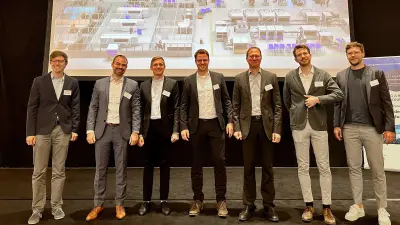Software-defined manufacturing: Funding project SDM4FZI on the home straight
At the Stuttgart Innovation Days 2024, a team from Bosch Research presented its results from the publicly funded project “Software-defined manufacturing for the automotive and supplier industry” (SDM4FZI) on the development and operation of flexible and modular production systems.

At the Stuttgart Innovation Days 2024 on 17 and 18 September held at the Alte Reithalle in the Maritim Hotel of the Baden-Württemberg state capital, the focus was on nothing less than the future of control technology. For the seventh time, the Institute for Control Engineering of Machine Tools and Manufacturing Units (ISW) of the University of Stuttgart was organizing this conference for experts from the fields of science and industry. The main theme this year: Software-defined manufacturing (SDM). Not by chance: The aim is to enable economical production in spite of volatile markets, and to do so in a purely software-defined manner — a crucial topic for the future. A team from Bosch Research was present.
Over the past three years, Johannes Fisel, SDM project manager, and Benedikt Feldotto, activities manager for software-defined factory operations, have been working on their vision together with their colleagues: to rethink the development and operation of production systems using established IT methods. To this end, the team separated production applications from hardware and infrastructure, comparable to smartphones. Their function and purpose is significantly influenced by the applications used — and therefore software-defined. The team transferred this principle to industrial production in the project SDM4FZI — Software-defined manufacturing for the automotive and supplier industry, which was funded by the Federal Ministry for Economic Affairs and Climate Action. In a large collaborative project with a broadly based consortium, around 30 project partners carried out fundamental and applied research. Bosch Research took over the role of consortium lead. The project will end on 30 September 2024. Some of the partners extended the term in order to complete individual aspects. The Bosch Research team has completed its project work and presented its results at the Stuttgart Innovation Days 2024.
In 2022, Johannes Fisel and his team had already presented the SDM concept at the Stuttgart Innovation Days, around one year after the project was launched. “Now we have come full circle; for us, the presentation of our results at the Stuttgart Innovation Days is a nice and successful conclusion to the project,” says Johannes Fisel. On 17 September, the first day of the conference, he and Michael Neubauer from the ISW reported on the vision and goal of the project, but also on the obstacles that had to be overcome and the solutions developed for this purpose. Examples include a reference model as a blueprint for digital twins and virtualized control technology that can be used to move machine control from the control cabinet to the edge cloud. The SDM concept addresses the major challenges of the present day, such as unstable supply chains and trade crises. In addition, the two researchers provided information about the partners involved and about which work packages were put together in order to achieve their results.
On the second day of the meeting, 18 September, Benedikt Feldotto spoke. In his presentation, he specifically addressed the results of the work package entrusted to the Bosch Research team: adaptable production systems through SDM. SDM as a solution for adaptability in a context of increasing product variance and decreasing quantities was a particular focus here. Benedikt Feldotto also presented industry examples: the Bosch research demonstrator for adaptable production at ARENA2036 and the reconfiguration of a tool changer based on asset administration shells on the digital twin in cooperation with HOMAG, Bosch Rexroth, ISG Industrielle Steuerungstechnik, and ISW.
Research and development in publicly funded projects is at a precompetitive stage. However, the demonstrators already show that the results have a high potential for industrial use. Precisely this is the next step: Together with Bosch business units, Bosch Research is developing opportunities to bring the SDM applications to market and also to use them in its own production.